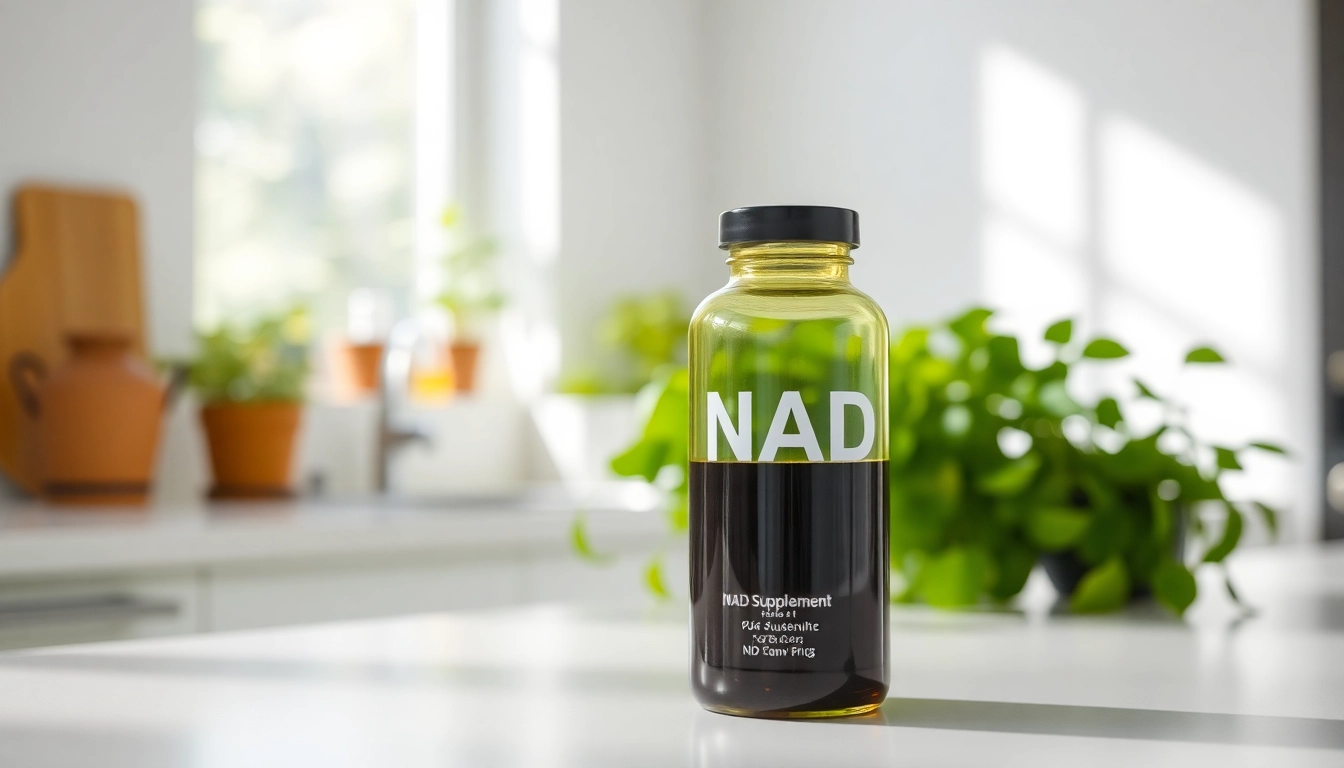Understanding NAD Supplements
What is NAD and Its Role in the Body?
Nicotinamide adenine dinucleotide (NAD) is a crucial coenzyme found in every cell of the human body. It exists in two forms: oxidized (NAD+) and reduced (NADH), and plays a significant role in various biological processes. One of its primary functions is to facilitate metabolic processes by acting as a carrier for electrons, thereby aiding the cellular production of energy in the form of adenosine triphosphate (ATP).
Notably, NAD is vital for the proper functioning of numerous critical biological processes, including DNA repair, gene expression, and cellular signaling. Aging and certain health conditions lead to a decline in NAD levels, which can adversely affect these essential functions. Therefore, supplementing with NAD supplements can play a crucial role in reversing some of the age-related declines in NAD levels.
How NAD Supplement Supports Cellular Repair
One of the key benefits of NAD supplementation is its potential to support cellular repair mechanisms, particularly via its role in activating sirtuins—proteins that are involved in cellular regulation, including aging and inflammation responses. Increased NAD levels can enhance the activity of these proteins, facilitating the repair of damaged DNA and improving cellular resilience.
NAD also plays a significant role in activating PARPs (poly (ADP-ribose) polymerases), enzymes that detect and repair DNA damage. By enhancing NAD levels in cells, these supplements can help optimize the body’s inherent repair systems, reducing the likelihood of ageing-related cellular dysfunction and promoting a healthier life span.
Different Types of NAD Supplements Available
The market for NAD supplements is diverse, offering several forms designed to enhance bioavailability and effectiveness. Common types include:
- Nicotinamide Riboside (NR): A form of vitamin B3, NR has emerged as a popular NAD booster due to its efficacy and minimal side effects.
- Nicotinamide Mononucleotide (NMN): NMN is another precursor to NAD and has shown promise in preclinical studies for improving metabolic health and neuronal function.
- NADH: The reduced form of NAD, which actively participates in cellular energy production. It is often marketed for its energy-boosting properties.
Health Benefits of NAD Supplements
Boosting Energy Levels Naturally
One of the most celebrated benefits of NAD supplements is their ability to enhance energy production. As the demand for energy increases, especially in muscle cells during exercise or stress, NAD assists in converting nutrients into ATP. By elevating NAD levels, individuals may experience improved endurance and reduced fatigue, leading to enhanced performance in physical activities.
Several studies have indicated that NAD supplementation can have positive effects on athletic performance, indicating that athletes and fitness enthusiasts may benefit from incorporating these supplements into their regimen for sustained energy levels.
Supporting Mental Clarity and Focus
NAD supplements are not solely beneficial for physical health; they also play a pivotal role in cognitive function. Improved NAD levels support enhanced neuronal health, brain plasticity, and overall cognitive performance. Many users report sharper focus, increased alertness, and improved memory retention when taking NAD supplements. This cognitive boost is essential not just for students but also for professionals and anyone seeking to improve their mental acuity.
Additionally, by combating oxidative stress in the brain, NAD supplements may contribute to long-term brain health and decrease the risk of neurodegenerative diseases.
Improving Overall Cellular Health
Cellular health encompasses more than just energetic processes; it also involves the ability of cells to survive and function correctly. NAD supplements assist in maintaining cellular integrity through several mechanisms:
- Repairing DNA damage: As mentioned earlier, NAD is crucial for the activity of sirtuins and PARPs which are responsible for DNA repair.
- Regulating metabolism: NAD influences various metabolic pathways, ensuring cells function optimally.
- Fighting inflammation: Increased NAD levels can help curb inflammatory responses in cells, promoting longevity and vitality.
Choosing the Right NAD Supplement
Considerations for Quality and Dosage
When considering NAD supplements, quality is paramount. Consumers should look for products that have undergone third-party testing for purity and potency. It’s also essential to choose the right dosage, which can vary based on individual health needs and goals. Generally, a range of 250-500 mg of NMN or NR per day is recommended, but it’s prudent to consult with a healthcare professional to tailor the dosage to personal health goals.
Best Practices for Incorporation into Your Routine
To maximize the benefits of NAD supplementation, consider integrating it into a balanced lifestyle. Here are some best practices:
- Take with food: Some users report better absorption of NAD supplements when taken with meals.
- Stay consistent: Regularity is key. Aim to take your supplements daily for sustained effects.
- Pair with a healthy lifestyle: Complement NAD supplementation with a balanced diet, adequate hydration, regular exercise, and sufficient sleep for optimal health benefits.
Understanding Labels: What to Look For
Reading and understanding labels can be intimidating, but key factors to consider include:
- Active ingredients: Ensure that the label specifies the type of NAD supplement (NR, NMN, or NADH).
- Additional ingredients: Check for any fillers or additives that may detract from the supplement’s quality.
- Expiration date: Always pay attention to the shelf life of the supplement to ensure potency.
Potential Side Effects and Considerations
Common Reactions to NAD Supplements
While many report positive effects from NAD supplementation, it’s also crucial to be aware of potential side effects. Common reactions include:
- Headaches
- Dizziness
- Digestive upset
- Skin flushing
These side effects are typically mild and can often be mitigated by adjusting the dosage or timing of supplementation. However, if serious or persistent symptoms occur, it is advisable to discontinue use and consult a healthcare professional.
Who Should Avoid NAD Supplement?
While NAD supplements are beneficial for many, certain individuals should exercise caution. Those with a history of kidney disease, or who are pregnant or breastfeeding, should consult a healthcare provider before beginning supplementation. Similarly, individuals on medications that affect the liver may need to avoid NAD supplements or adjust their dosage based on a healthcare professional’s advice.
Consulting Healthcare Professionals
Engaging in discussions with healthcare professionals is critical. They can provide personalized recommendations based on individual health conditions, medications, and overall goals. This proactive approach helps in maximizing the benefits of NAD supplements while minimizing any potential risks involved.
The Future of NAD Supplement Research
Current Studies and Findings
Research on NAD supplements continues to grow, with numerous studies investigating their long-term benefits and potential applications in medicine. Recent findings suggest that NAD supplementation may help mitigate the effects of age-related diseases such as Alzheimer’s, diabetes, and cardiovascular conditions. This evidence not only reinforces the beneficial role of NAD in human health but also suggests promising future avenues of research and therapy.
Potential Health Implications
The implications of increased NAD levels extend beyond individual health. A deeper understanding of NAD’s role in cellular health could pave the way for developing innovative therapies for chronic diseases. Researchers are also exploring how NAD precursors can support healthy aging, potentially extending health spans and quality of life.
Insights on Longevity and Aging
As populations age, the quest for methods to promote longevity and wellness becomes increasingly critical. NAD supplements could play a significant role in this paradigm, enhancing not only lifespan but healthspan—the period during which individuals remain healthy and active. The interplay between NAD levels, cellular repair, and aging presents a promising area for ongoing research, with the potential to unlock pathways to enhanced vitality and overall health.



